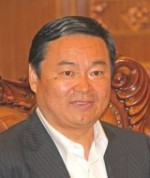 Name
Name
Hao Peng 郝鹏
Current status
Acting Governor, Qinghai Province
Born
1960
Relevance to Tibet
A rising leader with considerable experience in Tibetan areas, including the TAR between 2003 and 2013 (last post was Deputy Party Secretary).
 Name
Name
Hao Peng 郝鹏
Current status
Acting Governor, Qinghai Province
Born
1960
Relevance to Tibet
A rising leader with considerable experience in Tibetan areas, including the TAR between 2003 and 2013 (last post was Deputy Party Secretary).
Pronunciation: How Peng
Born: 1960, Shaanxi Province
Education: A rusticated or “sent-down” youth who worked in Gansu Province in the 1970s. Graduated from Northwest Polytechnical University (Shaanxi Province) in 1982.
Career: Worked in Gansu Province 1999 – 2003, rising to Deputy Party Secretary of Lanzhou City, before being transferred to the Tibet Autonomous Region as a Vice Chair of the TAR government, and Deputy Party Secretary from 2006 to 2013. Acting Governor of Qinghai Province since March 2013.
Prospects: Hao Peng’s experience in Gansu and the TAR seems likely to stand him in good stead for future promotion.
Relevance to Tibet: Head of the government of Qinghai Province, which encompasses large areas of Tibet.
Alternate Member of the 18th Central Committee.